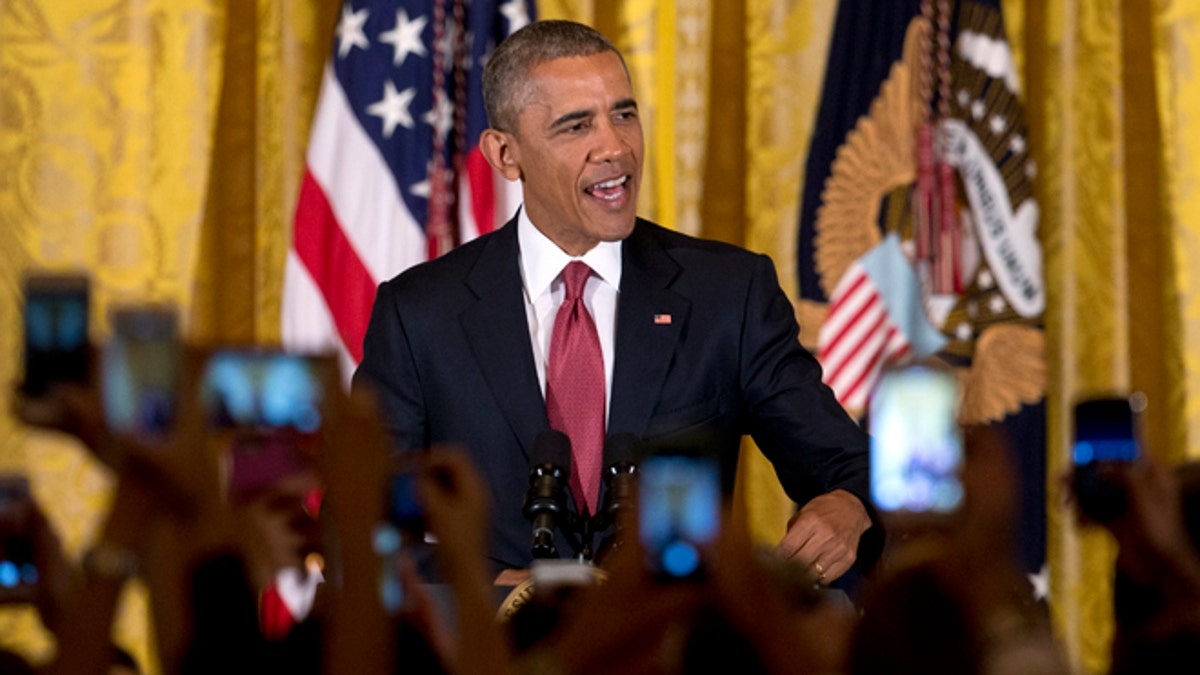
Audience members hold their cell phones high as President Barack Obama speaks during a Cinco de Mayo reception in the East Room of the White House in Washington, Tuesday, May 5, 2015. Obama says that when it comes to achieving a comprehensive overhaul of immigration laws progress is 'not always a straight line.' He says that despite his executive actions on immigration, Congress still needs to pass legislation to make more permanent changes. (AP Photo/Carolyn Kaster)
WASHINGTON (AP) – During a festive Cinco de Mayo celebration at the White House, President Barack Obama couldn't help but reflect on the swings that have confronted his attempts to tackle immigration. "I just want to remind everybody that progress is not always a straight line," he said.
It has been more than a year since he was first denounced as "deporter-in-chief," and he now was clearly savoring a friendlier atmosphere.
But few domestic policies have presented Obama with as many policy and political challenges as immigration. Buffeted by failed legislation, activist criticism, election year sensitivities and now judicial review of his latest executive actions, Obama has found that his self-described goal of fixing a broken immigration system is still not fully in his grasp.
"Sometimes you have to take this turn and that turn, go over this mountain and that valley," he told guests invited to the White House to observe the Mexican holiday.
At last year's Cinco de Mayo observance, Obama still held out hope that House Republicans would follow the Senate and pass a broad overhaul of immigration laws. It didn't happen and Obama faced a backlash from pro-immigrant groups who demanded he act on his own. Youth activists were calling on him to order a halt to most deportations of people living in the U.S. illegally. Protesters interrupted his speeches. Demonstrators gathered outside the White House gates.
Putting off his action until after the November election, Obama made his move Nov. 20 with some of the most sweeping changes to immigration laws, taking executive action to spare up to 5 million people, mostly parents and the young, from deportations. The administration also set new enforcement priorities that could make it easier for many more people in the U.S. illegally to stay in the country.
Marielena Hincapié, the executive director of the National Immigration Law Center, said Obama's executive actions amounted to "one of the most significant immigration policy changes in the last decade."
But the breadth of Obama's actions has raised constitutional questions. The main beneficiaries of Obama's actions are immigrants who have been in the U.S. illegally for more than five years but whose children are citizens or lawful permanent residents. Several states challenge the actions and a federal judge has halted their implementation as the case wends its way through the courts.
Republican lawmakers have unsuccessfully sought to halt funding for the program as well, calling it a vast overreach of Obama's authority.
"The immigrant community is hopeful that the implementation of those executive actions is inevitable, but the delay hurts," Hincapié said. "Every day that we continue without those executive actions being implemented means another day with injustices happening in our community."
Like us on Facebook




